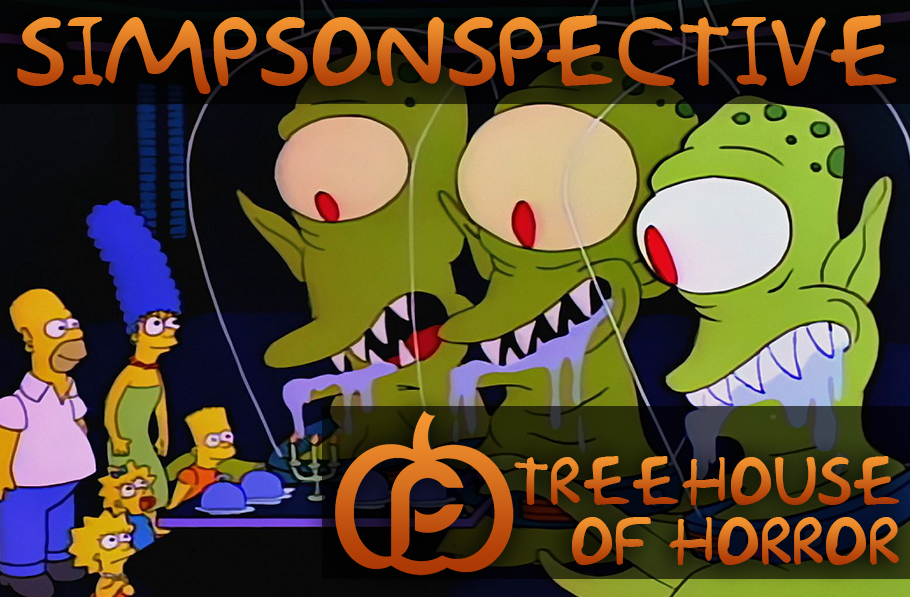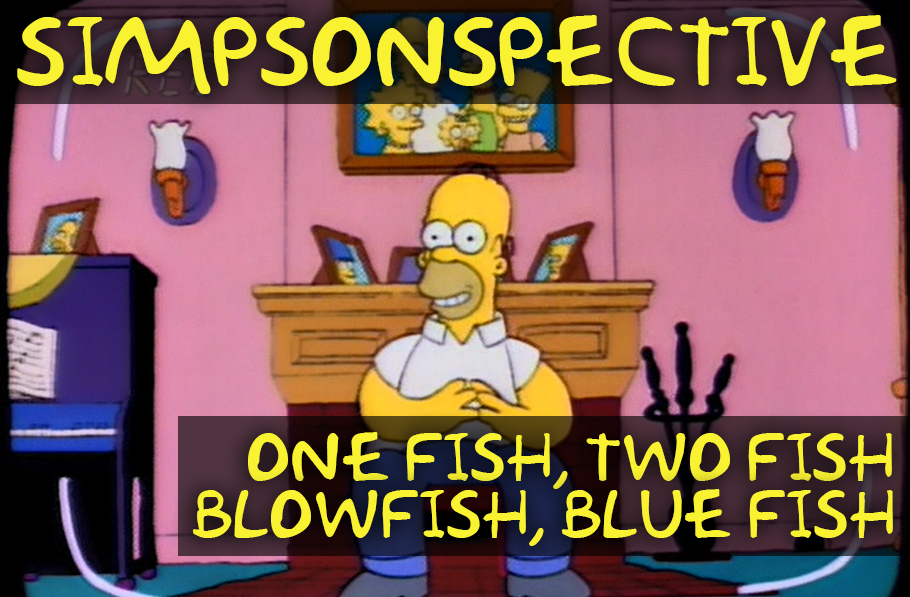Bart the Murderer | Simpsonspective
Richard Petro / 30 May, 2017
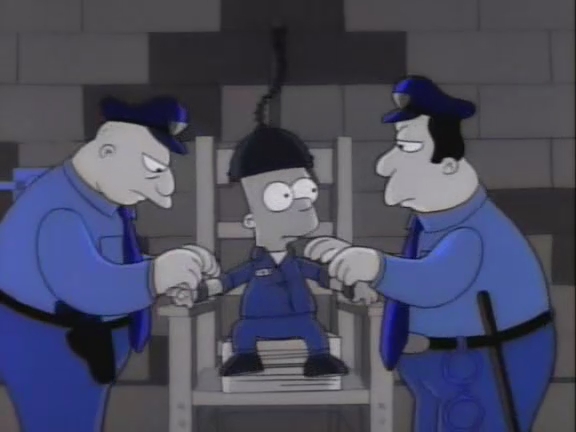
- Directed by: Rich Moore
- Written by: John Swartzwelder
- Airdate: October 10th, 1991
Bart awakens one day extremely happy, and he has a good reason to be, for that day he's taking a school trip to the chocolate factory. But his day hits a rapid downward spiral as he steps on a toy getting out of bed, Homer takes his cereal toy badge, the dog literally eats his homework, he misses the bus, it rains on his way there, and, in a final cruel twist of fate, it turns out he forgot his permission form for the field trip at home. With Bart being the only one to stay behind while apparently the entire school goes to the factory, he has to lick stamps for Principal Skinner. On his way home, it starts to rain again and his skateboard's wheel breaks, sending him tumbling down the stairs to an underground club… with a number of guns quickly pointed at his face. There he meets local mobster Fat Tony and his gang. They like Bart's tough standing up for himself, and bet on horse Don't Have A Cow to win a race to see if Bart's lucky. Sure enough, the horse wins. The gang's impressiveness with Bart grows more when it turns out he makes fantastic Manhattans. Bart becomes the gang's club assistant and even hides cigarettes for them, which turn out to be stolen. Marge begins to worry about Bart and sends Homer to spend some time with the gangsters, who fold to him in poker, allowing him to win. Of course, Homer is fooled by the acts and tells Marge that the only thing going on there is male bonding. Bart is kept for detention one day for trying to bribe Skinner and is late to work. In the club, Fat Tony has invited a head honcho to try one of Bart's Manhattans. Bart doesn't show up and Legs makes a Manhattan instead, which turns out to be flat, and the head mobster gives Tony the kiss of death before exiting. Bart arrives and Tony begins to ask questions as to why he is late. When Bart reveals that Skinner made him late, the gang pays him a visit. The next day, it is revealed that Skinner is missing. Bart has a nightmare about Skinner's corpse haunting him the following night. The police search for Skinner ends up going nowhere and the gang is arrested, along with Bart. When in court, the gang turns on Bart and says that he is the ringleader, and that he ordered the hit on Skinner. When he is about to be prosecuted, Skinner enters, explaining that he was trapped in his garage under newspapers for the past week. Bart is let go and Fat Tony tries to apologize, but Bart tells him he knows better and that crime doesn't pay. The gang leaves in their cars and the Simpsons go home and watch a movie made about the Bart/Skinner fiasco that has just passed.
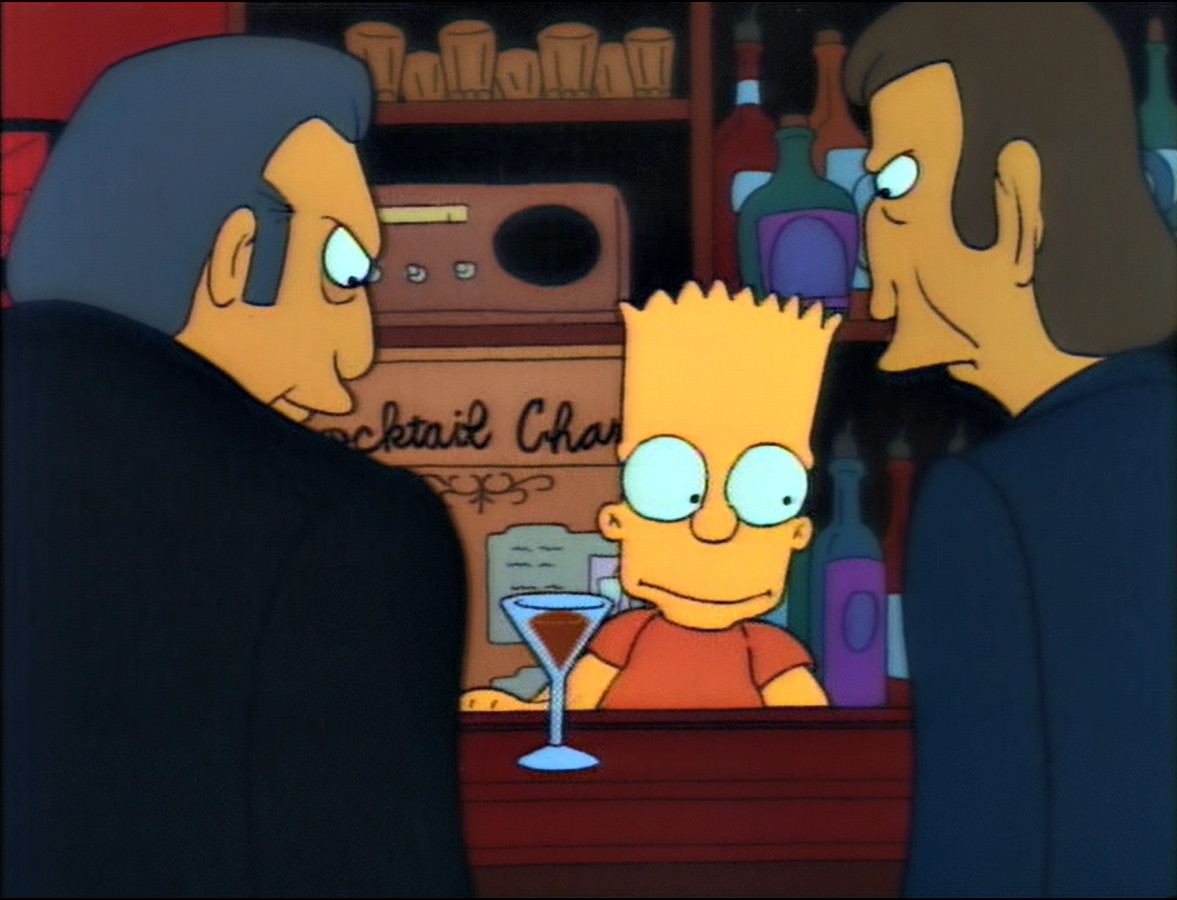 An underrated and somewhat forgotten episode of the first few seasons, Bart The Murderer is great on many levels. There are a plethora of visual/audio gags, great new characters, and one of the most absurd yet entrancing stories, but one that The Simpsons has become so well known for supplying and pulling off. Not to mention, it has an absolutely brilliant dream (or nightmare) sequence. I mentioned previously that a brilliant aspect of The Simpsons show is that you never know where the story is going to head in the first act. This story not only pulls that off, but is somewhat surprising in the events that unfold, especially with the gang eventually using Bart as a cover for them possibly getting thrown in jail.
An underrated and somewhat forgotten episode of the first few seasons, Bart The Murderer is great on many levels. There are a plethora of visual/audio gags, great new characters, and one of the most absurd yet entrancing stories, but one that The Simpsons has become so well known for supplying and pulling off. Not to mention, it has an absolutely brilliant dream (or nightmare) sequence. I mentioned previously that a brilliant aspect of The Simpsons show is that you never know where the story is going to head in the first act. This story not only pulls that off, but is somewhat surprising in the events that unfold, especially with the gang eventually using Bart as a cover for them possibly getting thrown in jail.
This episode introduced us to one of the favourite recurring characters in the series, Fat Tony. Tony is such a well defined character. It's true that he is nothing more at first than an obvious stereotype, but it that is something The Simpsons have always been great at. They created a lot of characters based on stereotypes and filled them with depth. You can't talk about Fat Tony without mentioning Joe Mantegna. Mantegna brings such a distinct voice to the character, and it perfectly embodies the him and gives you a clear idea of what kind of person he is the first time you meet him. Mantegna has also been incredibly protective of the fact that he play the character no matter what, going so far as to telling the crew on the series that if Tony so much as sneezes in an episode, he wants to be called in to do it. One thing that makes the character so great is his sensationally dry sense of humour, though it is never played as him trying to be funny and cracking jokes. With Tony also comes two now prominent characters to Simpson canon, Legs and Louie. Though they are always only there to support Tony, they each have a character of their own. What was interesting to me watching this again is the way the gang is shown doing things as opposed to just hearing what they do/did. We get hints of the fact that they have killed people, so of course they are dangerous. Yet, when Skinner is telling his story, we are shown the office confrontation between the gang and Skinner, where they nicely tell Skinner that Bart has potential, only for Skinner to yell at them to get out, and for Tony to respond with "Okay, okay, you don't have to yell." It is an interesting, and hilarious, balance. We hear and know that they are dangerous men, yet what we see portrays them as nothing more than normal people using the gangster image to gain people's fear.
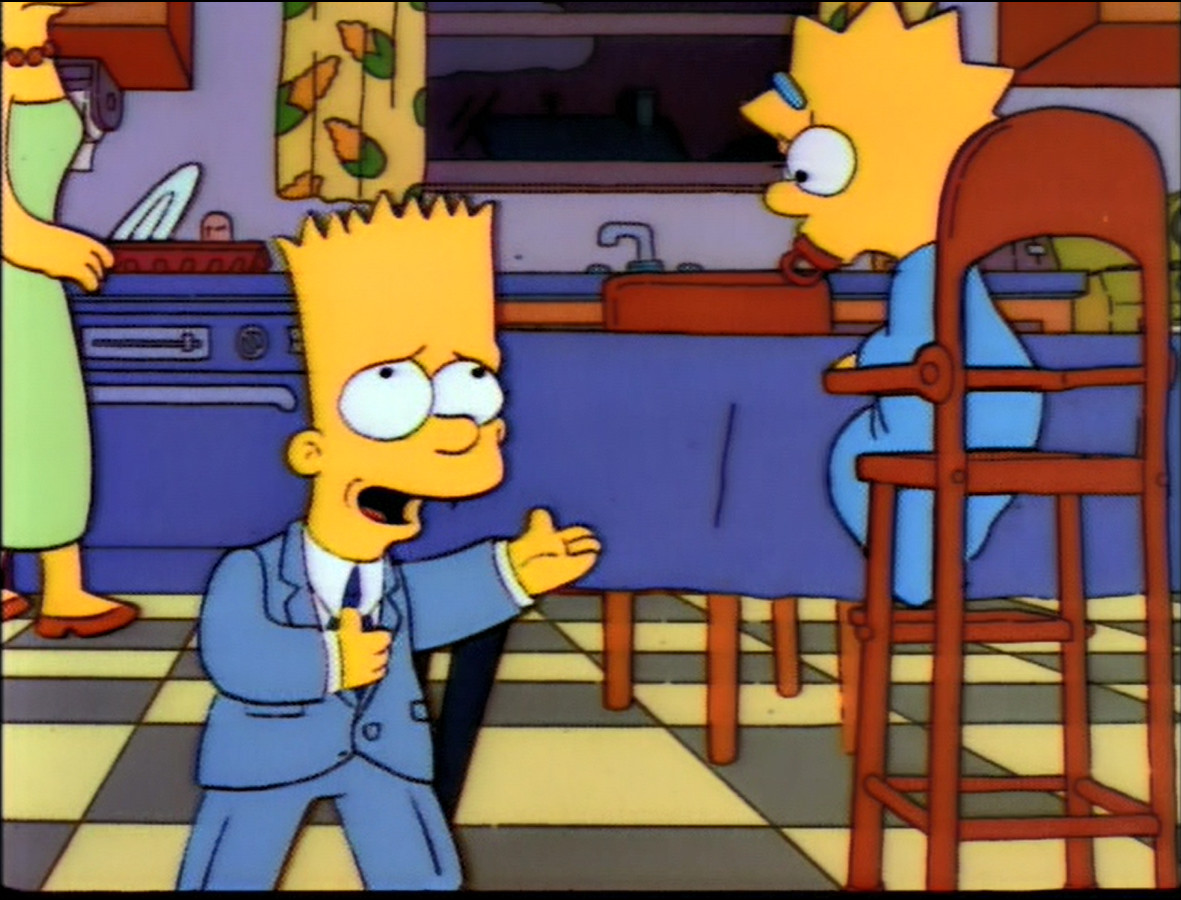 What's really well handled is the way that Bart is reeled into the crime world. Much like Bart The Daredevil, he sees and respects these people, though not really looking through things. When Bart does indeed ask Tony about whether or not he is a criminal, Tony explains it to Bart in a way that he would be suckered in to understanding. This sequence is exceptionally well written, with Tony asking if it was wrong to steal a truckload of bread for your huge starving family and, if they didn't like bread, but cigarettes, if it was alright stealing them cigarettes and then selling it to the family for an amount that was "practically giving it away." It's great because it works on fooling Bart in two ways. By the time the explanation is done there is no doubt that he might be a tad confused and, being a normal ten year old, he believes the gang is innocent because they're doing something good for their 'starving' family.
Once Skinner is revealed as missing, Bart has a nightmare about being confronted by the possibly dead Skinner. This is one of the greatest dream sequences done in the show, in my opinion. The segment is mostly black and white, save for a few splashes of colour, and shows Bart's guilty feelings in believing that he may be the reason Skinner is missing. The dream itself could be labeled as quite terrifying. At first, Bart is approached by a dead Skinner, who says that Bart killed him. Bart runs from this Skinner through an empty field as more Skinners crawl from the ground and give chase. Bart runs through a field of pussy-willows and falls face down into a small lake, where Skinner is tied down to a concrete block under, proclaiming to Bart that he's the reason he's dead. He runs up a pathway to a shed, where he opens the door and sees Skinner hanging from a meat hook in a freezer with other pieces of meat, once again proclaiming that Bart's the reason he's dead. Bart is convicted and thrown in jail, sharing a cell with a buff Sideshow Bob, and is then visited by Reverend Lovejoy (with a bit that always makes me laugh out loud every time). The nightmare sequence ends with Bart being put in the electric chair, needing two phone books to reach the helmet, and getting executed. The entire sequence is great, and one of my favourites of the second season.
What's really well handled is the way that Bart is reeled into the crime world. Much like Bart The Daredevil, he sees and respects these people, though not really looking through things. When Bart does indeed ask Tony about whether or not he is a criminal, Tony explains it to Bart in a way that he would be suckered in to understanding. This sequence is exceptionally well written, with Tony asking if it was wrong to steal a truckload of bread for your huge starving family and, if they didn't like bread, but cigarettes, if it was alright stealing them cigarettes and then selling it to the family for an amount that was "practically giving it away." It's great because it works on fooling Bart in two ways. By the time the explanation is done there is no doubt that he might be a tad confused and, being a normal ten year old, he believes the gang is innocent because they're doing something good for their 'starving' family.
Once Skinner is revealed as missing, Bart has a nightmare about being confronted by the possibly dead Skinner. This is one of the greatest dream sequences done in the show, in my opinion. The segment is mostly black and white, save for a few splashes of colour, and shows Bart's guilty feelings in believing that he may be the reason Skinner is missing. The dream itself could be labeled as quite terrifying. At first, Bart is approached by a dead Skinner, who says that Bart killed him. Bart runs from this Skinner through an empty field as more Skinners crawl from the ground and give chase. Bart runs through a field of pussy-willows and falls face down into a small lake, where Skinner is tied down to a concrete block under, proclaiming to Bart that he's the reason he's dead. He runs up a pathway to a shed, where he opens the door and sees Skinner hanging from a meat hook in a freezer with other pieces of meat, once again proclaiming that Bart's the reason he's dead. Bart is convicted and thrown in jail, sharing a cell with a buff Sideshow Bob, and is then visited by Reverend Lovejoy (with a bit that always makes me laugh out loud every time). The nightmare sequence ends with Bart being put in the electric chair, needing two phone books to reach the helmet, and getting executed. The entire sequence is great, and one of my favourites of the second season.
Another sequence I must talk about in this write up is the fantastic, absurd, and entrancing story that the returning Skinner tells to the full courthouse concerning his whereabouts. It turns out that he ended up kicking the trio of gangsters out of his office and then journeyed home, where, as he was tying up his newspapers, an enormous stack fell on him, and thus he could not get out. He saved himself from starving by eating his mom's preservatives and kept sane by bouncing a basketball. He realized the police wouldn't find him and proceeded to save himself by making a miniature rocket and tying it to a nearby vacuum. He launched the rocket, held onto the cord, and, when the vacuum tied around a pole above him, hit the cord retract button which pulled him from under the newspapers. It never fails to astound me with the number of absurd scenarios the writers always came up with, and this short bit is full of them while still somehow keeping it in a realm of 'realism', so to speak. The simple, slight change in design of the stubble faced, clothes crumpled, disheveled looking Skinner is also a treat.
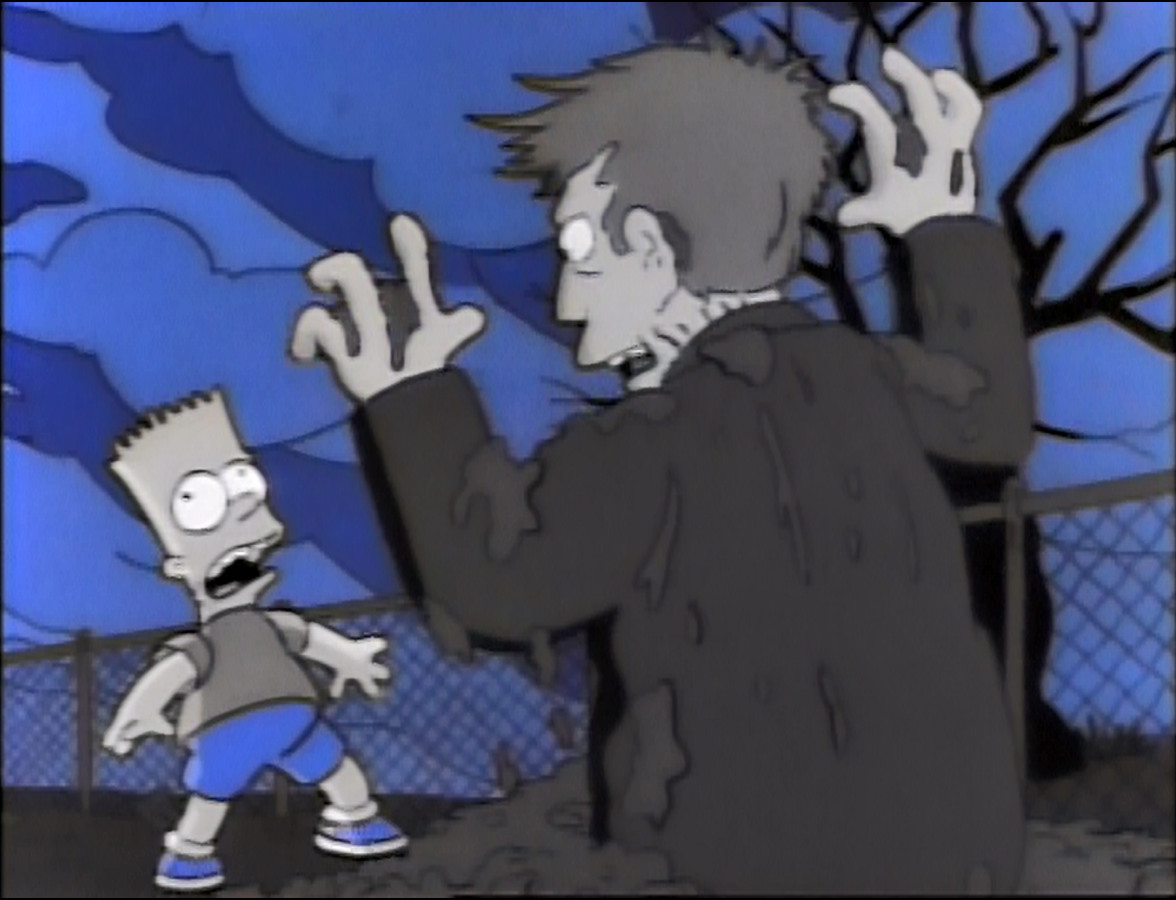 A fantastic edition to the line-up of early Simpsons episodes, this one is rife with great jokes, and an episode that may unfortunately fall into the category of jokes you might not remember as well as classic lines. From Tony's answers to Wiggum's questions, to the two sequences listed above, to the pure high quality story it tells, it's one that deserves to be revisited to experience how great it comes together. Though you could say that about a lot of episodes during this run.
A fantastic edition to the line-up of early Simpsons episodes, this one is rife with great jokes, and an episode that may unfortunately fall into the category of jokes you might not remember as well as classic lines. From Tony's answers to Wiggum's questions, to the two sequences listed above, to the pure high quality story it tells, it's one that deserves to be revisited to experience how great it comes together. Though you could say that about a lot of episodes during this run.
Also, this should be noted, is the great cheap shot that the creators take at themselves at the end of the episode. When watching the Bart Simpson Story, starring Neil Patrick Harris as Bart, Homer asks when they will be seeing money from the production. Marge tells him that they were told that the story was changed enough so that they do not have pay the Simpsons family money. Homer then remarks: "You know who the real crooks are? Those sleazy Hollywood producers." This is then followed with 'Executive Producers James L. Brooks, Sam Simon, & Matt Groening' being overlaid onto the image of an angry faced Homer.
Favourite Quotes And Bits: 5) Groundskeeper Willie: I thought I found him, but it was only a cat. 4) Marge (after Bart describes what he does at his job): I don't think me and your father want you doing that. Homer, say something. Homer: How much does it pay? Bart: 30 Dollars a week. Homer: Pfft, I make more money than that. 3) Skinner: And how, may I ask, did you get past the hall monitors? 2) Wiggum: Fat Tony is the cancer to this fair city. He is the cancer and I am the…. uh, what cures cancer? 1) Bart's Dream: (Reverend Lovejoy enters Bart's cell) Bart: Reverend Lovejoy? You've come to comfort me? Lovejoy: Yes, Bart. (pats Bart on back without emotion) There, there…. there, there.

